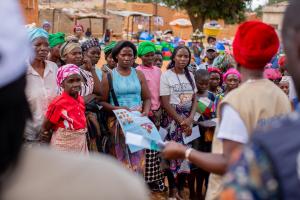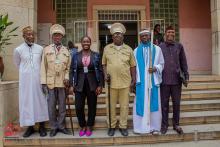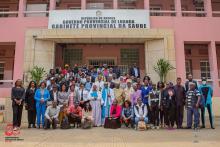Faith, Trust, and Vaccines: How Community Leaders Are Protecting Children Against Polio in Angola
With his staff in hand and the firm voice of someone on a mission, Reverend Manuel Miranda, leader of the Prophetic Union of Angels Church in Camama, Luanda, addresses a group of parents who are sceptical about the new polio vaccination campaign. "Reverend, we don’t understand the reason for yet another campaign. Won’t so many vaccines harm our children?” Ask one of the parents. Calmly, the pastor replies: “The vaccine is protection, not a threat. Polio can paralyse a child for the rest of their life. Vaccination is an act of love and responsibility.”
João Diniz is more than a religious leader. For over three years, he has been a community mobiliser committed to public health and protecting Angolan children. His voice echoes in churches, traditional healing centres, and community meetings, where he spreads messages of trust and prevention.
Angolan communities have been key allies in the fight against diseases that vaccination can prevent. Thanks to the joint efforts of the Angolan Government, WHO, UNICEF, international partners, and thousands of local volunteers, the country was declared free of wild poliovirus circulation in 2015. However, in 2025, Angola is facing an outbreak of type 2 poliovirus, with 14 cases confirmed in four provinces.
To contain the spread, the country has launched a national vaccination campaign to immunise more than 6.9 million children under five. Community mobilisation is at the heart of this response. Religious leaders, traditional healers, and community health workers are key in disseminating public health messages.
To strengthen this network, the Ministry of Health, with support from WHO and other partners, has implemented a multisectoral strategy that includes ongoing training, educational materials, logistical support, communication in local languages, and food subsidies. This approach has been key to combating rumours, post-vaccination fears, and misinformation, factors that fuel vaccine refusal in some communities.
‘The active participation of communities is an essential pillar for the success of the polio eradication programme in Angola,’ says Dr José Chivale, coordinator of the WHO team responsible for the fight against polio in the country.
“Despite strong community involvement, we continue to face challenges related to vaccine refusal. Religious beliefs, lack of information, fears about side effects, and mistrust of institutions make full adherence difficult. That is why the role of community leaders is fundamental: it is they who, through their proximity and credibility, can engage families, clarify doubts, and ensure that all children are protected.”
In Angola, where access to family doctors is limited, community leaders and health workers represent public health. They identify suspected cases of acute flaccid paralysis (AFP), notify health authorities, and ensure that families receive adequate support and information.
According to Dr Maria Martins, who is responsible for health promotion in Luanda, ‘without the community, health does not reach everyone. The local leaders know the reality and help us adapt our responses to cultural and social diversity.’
The first round of the national vaccination campaign will take place between 15 and 17 August, with the support of the Global Polio Eradication Initiative (GPEI). The operation includes procuring vaccines, detailed planning, community mobilisation, training, and supervision of vaccination teams.
Polio is a severe disease that causes paralysis and can be completely prevented through vaccination. Its eradication is a national and global commitment. In Angola, where preparations are underway for the first round of the vaccination campaign, efforts are being intensified to ensure the active participation of donors, health professionals, and families to carry out a successful campaign and protect all children, thus ensuring a polio-free future for the country.


